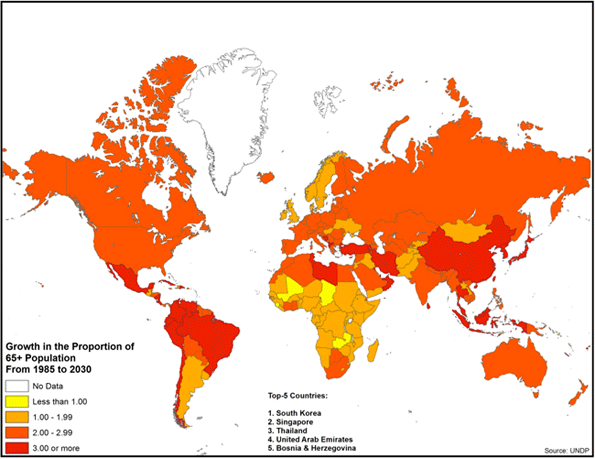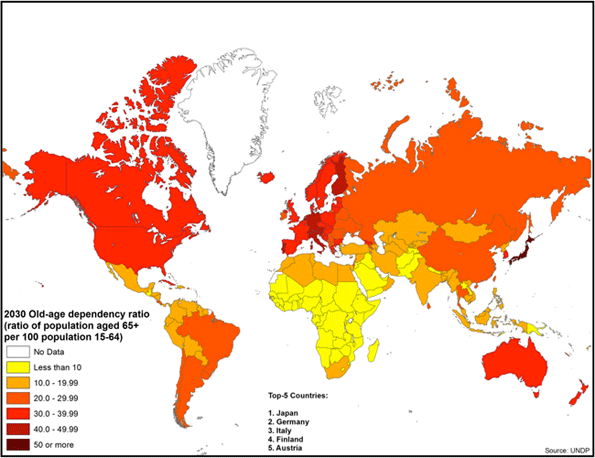
The world’s population recently passed the 7 billion mark, and, of course, the news was greeted with hysteria and consternation in the media. “It’s not hard to be alarmed,” intoned National Geographic. “We should all be afraid, very afraid,” warned the Guardian.
To be sure, continued population increases, particularly in very poor countries, do threaten the world economy and environment — not to mention these countries’ own people. But overall the biggest demographic problem stems not from too many people but from too few babies.
This is no longer just a phenomenon in advanced countries. The global “birth dearth” has spread to developing nations as well. Nearly one-third of the 59 countries with “sub-replacement” fertility rates — those under 2.1 per woman — come from the ranks of developing countries. Several large and important emerging countries, including Iran, Brazil and China, have birthrates lower than the U.S.
In the short run this is good news. It gives these countries an opportunity to leverage their large, youthful workforce and declining percentage of children to drive economic growth. But over the next two or three decades — by 2030 in China’s case – these economies will be forced to care for growing numbers of elderly and shrinking workforces. For the next generation of Chinese leaders, Deng Xiaoping’s rightful concern about overpopulation at the end of the Mao era will shift into a future of eldercare costs, shrinking domestic markets and labor shortages.

This scenario is already a reality in Japan and much of the European continent, including Greece, Spain, Portugal, much of Eastern Europe, Scandinavia and Germany. Adults over the age of 65 make up more than 20% of these countries’ populations — compared with 15% in the U.S. — and their numbers could double by 2030, according to researchers Emma Chen and Wendell Cox.
In many of these countries, rising debt burdens and shrinking labor markets have already slowed economic growth and suppressed any hope for a major long-term turnaround. The same will happen to even the best-run European economies, just as it has in Japan, whose decades-long growth spurt ended as its workforce began to shrink.
By 2030 the weight of an aging population will strangle what’s left of these economies. Germany, Japan, Italy and Portugal, for example, will all have only two workers for every retiree. The U.S. will fare somewhat better, with closer to three workers per retiree. By 2030 the median age will also be higher in China and Korea than in the U.S. This age difference will grow substantially by 2050, according to the Stanford Center on Longevity.
The biggest impact of aging, however, will not occur in northern Europe and Japan, where there may be enough chestnuts hidden away to keep the aged fed, but in Asia. In the next few decades, South Korea, Taiwan, Singapore, Thailand, and even Indonesia will start following Japan into the wheelchair stage of their demographic histories. These are not quite rich places like China and Brazil, which still lack the wealth and a developed welfare state to take care of the elderly Although not headed directly to European or Japanese rates of aging, these countries will experience a doubling of their Old Age Dependency Ratios; both will rise slightly above current U.S. levels by 2030.

In China, the one-child policy could be used to explain this phenomenon, but this hardly accounts for declining birthrates and rapid aging in countries such as Iran, Mexico or Brazil. Other factors — urbanization, a secular society and upwardly mobile women — also appear to be playing an important role.
Of course, the populations in most developing countries will still grow, but more due to longer lifetimes than a surfeit of new births. But projections are often wrong, and their demographic trajectory may slow down more than now predicted.
The one region expected to continue growing is Africa. Some countries, like Nigeria and Tanzania, are expected to more than double or even triple their current populations by 2050. But as Africa urbanizes and develops, it may eventually experience the same unexpected decline in fertility we already see in Islamic Iran, multi-cultural Brazil or throughout east Asia.
Largely left out of the analysis may well be the next big demographic phenomenon: the rise of childlessness. We have already seen how the move in developing countries from six kids or more per household has reduced population growth. In a similarly dramatic way the shift towards zero children, particularly in wealthier countries could have unforeseen lasting consquences. After all, with two children, or even with one kid, there’s the possibility of two or more grandchildren. With no children, it’s game over — forever.
Of course, there have always been unmarried people and childless people; some by necessity or health reasons, others by choice. But now a growing proportion of young child-bearing age women in countries as diverse as Italy, Japan and Taiwan are claiming no intention of having even one child. One-third of Japanese women in their 30s are unmarried, and similar trends are developing in other Asian countries.
Life without marriage, and children, has also become the rage among a large proportion of the cognoscenti even in historically procreation-friendly America. Whether it’s because men are seen as weak, or children too problematical, traditional families could erode further in the decades ahead.
The chidlessness phenomenon stems largely from such things as urbanization, high housing prices, intense competition over jobs and the rising prospects for women. The secularization of society — essentially embracing a self-oriented prospective — may also be a factor.
If this trend gains momentum, we may yet witness one of the greatest demographic revolutions in human history. As larger portions of the population eschew marriage and children, today’s projections of old age dependency ratios may end up being wildly understated. More important, the very things that have driven human society from primitive time — such as family and primary concern for children — will be shoved ever more to the sidelines. Our planet may be less crowded and frenetic, but, as in many of our child-free environments, a little bit sad and lot less vibrant.
Our future may well prove very different from the Malthusian dystopia widely promoted in the 1960s and still widely accepted throughout the media. With fewer children and workers, and more old folks, the “population bomb” end up being more of an implosion than an explosion.
This piece originally appeared at Forbes.com.
Joel Kotkin is executive editor of NewGeography.com and is a distinguished presidential fellow in urban futures at Chapman University, and an adjunct fellow of the Legatum Institute in London. He is author of The City: A Global History. His newest book is The Next Hundred Million: America in 2050, released in February, 2010.
Photo "Nursery Cart" by flickr user Pieterjan Vandaele













Thanks for taking the time
Thanks for taking the time to discuss that, I feel strongly about this and so really like getting to know more on this kind of field. Do you mind updating your blog post with additional insight? It should be really useful for all of us.
foods to improve eye vision naturally
Thanks for sharing the
Thanks for sharing the post.. parents are worlds best person in each lives of individual..they need or must succeed to sustain needs of the family.
text your ex back 2.0 michael fiore method
It is not the healthy who need a doctor.
This is really interesting i completely agree with the information. Thanks for guiding me through a lot of things. It was really a eye opener for a lot of people.
If you would like to speak with a member of our caring staff, please feel free to visit www.medicalsolutionsforwomen.com
The website is looking bit
The website is looking bit flashy and it catches the visitors eyes. Design is pretty simple and a good user friendly interface.
girlfriend activation video
You’ve got some
You’ve got some interesting points in this article. I would have never considered any of these if I didn’t come across this. Thanks!.
additional reading
The website is looking bit
The website is looking bit flashy and it catches the visitors eyes. Design is pretty simple and a good user friendly interface.
Going Here
Admiring the time and effort
Admiring the time and effort you put into your blog and detailed information you offer!..
Web Site
This blog is so nice to me.
This blog is so nice to me. I will keep on coming here again and again. Visit my link as well..
Find Out More
Interesting post. I Have
Interesting post. I Have Been wondering about this issue, so thanks for posting. Pretty cool post.It 's really very nice and Useful post.Thanks
Keylogger Detect
Debunking overpopulation myth
I agree that we need to be much more critical of overpopulation/"too many people on the planet" fearmongers, who do not seem to consider issues like inequality and bad infrastructure as the real problems, and simply view people as consumers and not producers. There are actually many reasons to celebrate 7 billion - this milestone proves how ingenious we are, that we're better at keeping more people alive longer now than ever before, and we have more brains to create and develop more useful technologies and innovations to accommodate a growing population. Yes, there are still problems of starvation and lower standards of living for many on the planet, but neither history nor mathematical logic bears out the conclusion that population pessimists reached of resource scarcity. Where there are these problems, we need to go about creating more for everyone rather than curbing our numbers. In the Victorian times, the world's population was a small fraction of what it is now, yet there was still poverty. What changed and improved our lives in the West was not going down from 1 billion to less, but improving sanitation, healthcare, our general standards of living, and discovering and taking advantage of scientific breakthroughs. We should see humanity as a solution and not the problem. I came across a spoof recently that parodies the many ridiculous overpopulation fears and paranoia - it is hilarious and brilliant! http://www.worldbytes.org/get-off-my-planet-happy-birthday-7-billion/